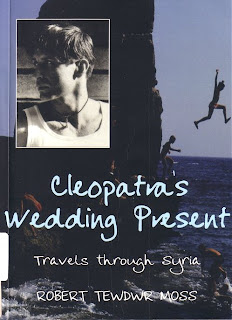Music and Murder on the Orient Express

Accustomed as we are to our Western ideas on the importance of life, it is difficult to adjust our thoughts to a different scale of values. And yet to the Oriental mind, it is simple enough. Death is bound to come - it is as inevitable as birth; whether it comes early or late is entirely at the will of Allah. And that belief, that acquiescence, does away with what has become the curse of our present-day world - anxiety. There may not be freedom of want, but there is certainly freedom from fear. And idleness is a blessed and natural state - work is the unatural necessity.Surprisingly those wise words come from Agatha Christie. She was in eastern Syria for an extended period in the 1930s with her second husband the archaeologist Max Mallowan and the quote is from her book about their experiences there, Come Tell Me How You Live. I came across it via a reference in Cleopatra's Wedding Present, Travels through Syria by Robert Tewdwr Moss. This compelling and topical book was published in 1997 in contentious circumstances. Robert Tewdr Moss was murdered in 1996 while working on the final draft. Despite that definitive version being erased from Tewdr Moss' word processor by his murderer, the book was edited and controversially published posthumously by a close friend, not by the publisher who originally commissioned it.
One section of Cleopatra's Wedding Present comes close to forecasting the circumstances of Robert Tewdr Moss' murder, and this invites comparisons between him and the French Canadian composer Claude Vivier who predicted his own death in an unfinished opera. Tewdr Moss and Vivier were both enormous talents who, despite the inevitability of death, were taken from us far too early. They were almost the same age when they died and both were openly gay men who were murdered by casual acquaintances. Claude Vivier's story is told in my post Pushing the classical music envelope.

Richard Rodney Bennett's music for the film of Agatha Christie's Murder on the Orient Express provides the soundtrack to this post. As I write the 1974 EMI recording with the composer at the piano directing the Orchestra of the Royal Opera House and with legendary EMI staff producer Christopher Bishop in the unfamiliar control room at CTS Studios Wembley plays.
While a student at the Royal Academy of Music in London Richard Rodney Bennett performed Paul Bowles' 1947 Sonata for Two pianos with Cornelius Cardew and over five decades has continued to explore the avant garde as a composer and performer. So it must be assumed he has never received the attention he deserves as a contemporary composer because not only has he dared to venture into film scores, jazz and cabaret, but, even worse, he has achieved considerable success in those genres.
This retrogressive stereotyping means much fine music is neglected. My CDs of Richard Rodney Bennet's compositions include his masterly Partita for Orchestra, of which a reviewer wrote "blindfolded you might easily guess some newly discovered score by Bernstein or Copland", a very rewarding disc of music for flute and orchestra by the New Zealand Chamber Orchestra, his complete solo piano music performed by Martin Jones (now deleted), and a CD of choral music, including an irridescent Missa Brevis, sung by the Cambridge Singers directed by John Rutter, with alongside them a disc of songs setting the lyrics of Johnny Mercer. These are just some of the proof that Richard Rodney Bennett should be cherished as a living example of how pushing the classical music envelope and racing down to the lowest common denominator do not need to be synonymous.

* In his 75th birthday year Richard Rodney Bennett performs and is performed at the 2011 BBC Proms.
Also on Facebook and Twitter. Any copyrighted material on these pages is included as "fair use", for the purpose of study, review or critical analysis only, and will be removed at the request of copyright owner(s). Report broken links, missing images and errors to - overgrownpath at hotmail dot co dot uk









Comments
http://en.wikipedia.org/wiki/Baron_Hotel
I spent yesterday evening listening again to some CDs of RRB's music - what delights are to be found there for those that do not know it.
Here is the link to the Julian Bream article -
http://www.overgrownpath.com/2008/07/playing-anniversary-game.html
http://www.overgrownpath.com/2009/08/music-as-last-bulwark-against-barbarity.html